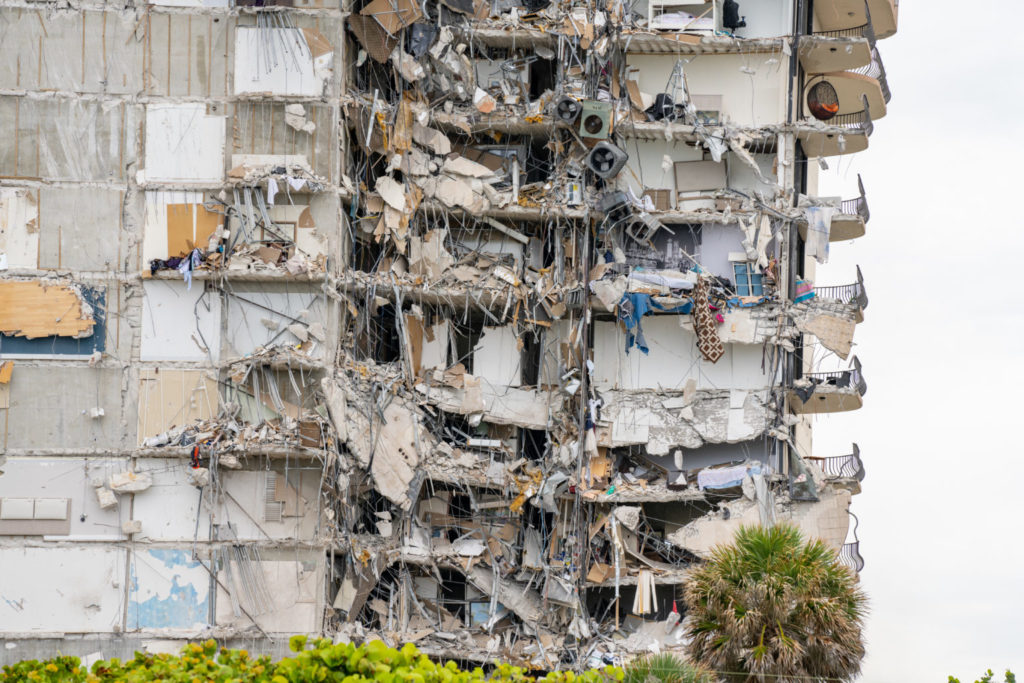
This article on the changes coming to Florida’s condos reserves came out today and it’s something that we in the real estate industry have been talking about for a few months now. Back in May of 2022, Governor Ron DeSantis passed a new law designed to protect condo owners after the collapse of the Surfside condo building. It set statewide standards for more frequent inspections and which requires condo boards to set aside money for critical repairs. This new legislation will affect condo projects that are 25 years and older and any that are over 3 stories will require a structural inspection and structural reserve study and the reserves can no longer be partially funded.
However the well intentioned new law has some condo owners feeling the pinch in their wallets.
Florida’s Senate Bill SB 4-D includes requirements for preventative maintenance and construction inspections on buildings three stories or higher, and for condo associations to collect and maintain structural integrity reserve studies and funds. Under the new law, condos will not be able to have underfunded reserves. To fund a reserve pool of money, 50% or more of the total cost for a condo’s repairs must be maintained.
Associations are now required to perform a reserve study every 10 years for repair costs that meet or exceed $10,000. Associations must then mail their structural integrity studies to condo owners, who will contribute to the reserve together through an association-approved payment plan. A reserve study is a long-term financial planning tool that analyzes the condition of major components of the condominium property, and their estimated repair or replacement costs. By determining these factors, condo associations can then accurately budget for capital repair and replacement expenditures over time. For example, if a condominium needs $1 million to replace its roof in 10 years, its next annual budget should include $100,000 in reserves. Ideally, the association will continue to reserve $100,000 each year for the next 10 years in order to raise the necessary $1 million by the time the roof needs to be replaced. A reserve study takes this general formula and applies it to every major component on the condominium property.
The problem is that until recently, Florida law did not require condos to conduct reserve studies, and, despite annual budgets being obligated to include reserves for capital expenditures and deferred maintenance, associations were previously allowed to waive or reduce reserve contributions through a membership vote.
Unit owners often exercised this ill-advised option to keep assessments as low as possible and/or to avoid paying for major components scheduled to be repaired or replaced, which they contemplated would be after the sale of their units. Continuing with the example above, if unit owners contemplated selling their units in less than 10 years, and therefore would not directly benefit from the new roof, they were likely to vote to waive or reduce the $100,000 in reserves. By doing this, the unit owners simply kicked the can down the road for themselves, or they literally passed the financial burden of the new roof on to the subsequent unit owners. Either way, this practice illustrates why so many condominiums are severely underfunded.
Beginning in 2025, members of a unit owner-controlled condo association may not elect to provide no reserves or less reserves than required for the following building components: (1) the roof; (2) load-bearing walls or other primary structural members; (3) floors; (4) the foundation; (5) fireproofing and fire protection systems; (6) plumbing; (7) electrical systems; (8) waterproofing and exterior painting; (9) windows; and (10) any other item that has a deferred maintenance expense or replacement cost that exceeds $10,000 and the failure to replace or maintain such item negatively affects one or more of the components above, as determined by a licensed engineer or architect performing the visual inspection portion of the SIRS.
The changes to the Act are intended to prevent another tragedy, but some of the newly identified building components are questionable at best. No one doubts, for example, that a foundation is vital to a building’s overall structure. But performing a visual inspection of this component is extremely difficult or practically impossible without substantial destructive work. The new legislation ignores this reality and arguably requires the inspector to assign it a useful life in the SIRS so the association can, in turn, establish it as a reserve amount. Equally elusive may be determining the useful life of the condominium’s floors, load-bearing walls, or other primary structural members.
The new legislation also adds windows as a SIRS item, but in many condominiums unit owners are responsible for replacing and repairing the windows that are considered part of the units. This exemplifies the potential discrepancies that may now exist between a condominium’s governing documents and the new legislation. These ambiguities not only burden the condominiums, but also the licensed architects and engineers that are supposed to perform SIRS inspections for determining mandatory reserve contributions.
At this point, the only thing that seems certain for many condominiums, is that assessments are going to increase. Even if the legislature addresses S.B. 4-D’s technical problems, it is unlikely that the structural integrity reserve study and mandatory reserve requirements will go away. This means, at the very minimum, condominium associations will have to pay for structural integrity reserve studies, and they will have to begin setting aside reserves for the new components listed above, as well as make up for any underfunded reserves that were previously waived or reduced.
The new legislation is truly a “time to pay the piper” moment for older condominiums where skipping a reserve study, and/or waiving or reducing reserves has been an annual tradition. Also, when these new reserve requirements are tacked onto other association expenses, such as repairs for substantial structural deterioration and/or rising insurance premiums, some condominiums may learn that the price tag of continuing on is simply not achievable.
From a real estate perspective, this could have a temporary downward effect on the prices of condos older than 25 years if a glut of units hit the market because owners do not want to deal with the ramifications of the new legislation. I think we are going to potentially see owners in these condos want to move to a villa, townhome or single family home. Many people no longer want to be on condo boards anymore because it’s a tremendous amount of liability.
“You’re volunteering to give back to your community, basically, and you’re potentially liable if you decided not to repair the seawall when it was supposed to be repaired,” he continued. “So there’s going to be a lot of shakeups down in Florida.”
Champlain Towers was 40 years old and in need of major repairs when it collapsed on June 24, 2021. It’s led to officials looking at the need to ensure other aging structures are safe, as 98 people were killed in the tragedy.” Source
What can you do if you want to buy a Florida condo?
Know that these changes to Florida condo law are coming. And they are for a good reason. No one wants to live in an unsafe building, but unfortunately some boards have put off necessary repairs for too long, because no one wanted condo fees to increase. Now condo owners may not have a choice but to make repairs.
If you are buying a condo, do your homework. If you are looking at a 25+ year old building with over 3 stories, it would be wise to request 6 to 12 months of prior meeting minutes from the condo board so that you can see what’s being discussed as it pertains to special assessments and condo fee increases.
At the top of your budget on a condo with the condo fee included? It may make sense to buy a slightly lower priced unit and budget in considerations for potential increases in condo fees as 2024 approaches.
What can you do if you can’t afford a potential condo fee increase or special assessment coming to your condo community?
It may make sense to sell soon if you cannot afford a higher condo fee or potential special assessments coming to your condo community. However, if the special assessments have already been decided by the board, you may still have to pay the assessments out of your closing proceeds in order for a sale to go through. This is something to discuss in more detail with a licensed Florida real estate agent, like myself.
Questions? I’m a click or a call away.


Leave a Reply